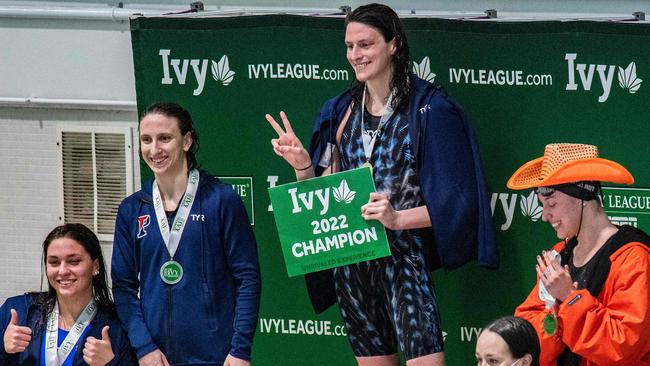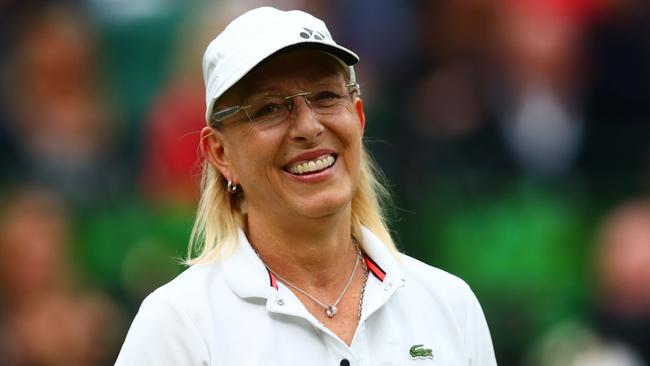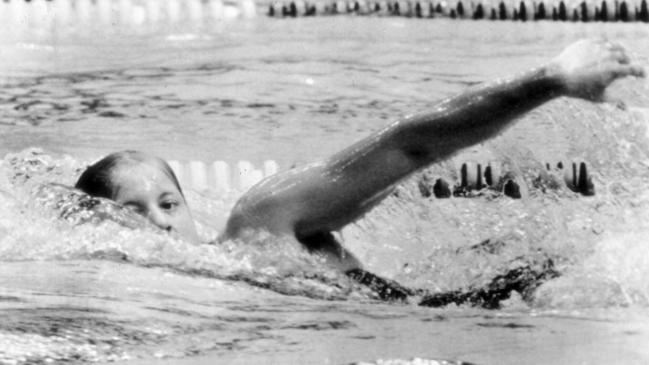Olympic champion Nancy Hogshead-Makar on why trans women get an unfair advantage in sport
Nancy Hogshead-Makar has been dubbed a bigot and transphobic because she quotes the science to prove trans women athletes have an unfair advantage.

When asked how she felt when American transgender swimmer Lia Thomas took the blocks at the NCAA championships last week, Olympic champion, civil rights lawyer and women’s sport activist Nancy Hogshead-Makar replied “disgust” around the unfairness of it all.
“Lia is not that same calibre athlete,” Hogshead-Makar tells The Weekend Australian. “Look, she’s the last person off the starting blocks. She has terrible turns. She has no underwater game — but she has what nobody else has, which is male puberty.”
Hogshead-Maker is a strong voice in a fierce debate that has been triggered again, this time by the rise of Thomas, who at the National Collegiate Athletic Association championships last week was first in the 500-yard freestyle final, beating her nearest competitor, Olympic silver medallist Emma Weyant, by more than a second and a half.
Thomas, who started her collegiate swimming career with three years on the men’s team before having hormone therapy and taking her place on the women’s team this year, recently told Sports Illustrated she would like to swim at the Paris Olympics.
“I just want to show trans kids and younger trans athletes that they’re not alone,” Thomas said. “They don’t have to choose between who they are and the sport they love.”
Thomas was not breaking the rules by competing last week — she had been on hormone therapy for two years, longer than the NCAA required one year — but her recent performances have thrust the issues around trans women elite athletes into the spotlight.
The conversation around Thomas has centred on inclusion. It has also focused on the fundamental question of fairness — do trans women have an advantage in elite sports?
Hogshead-Makar and her good friend, nine-time Wimbledon champion and fellow Women Sports Policy Working Group member Martina Navratilova, say if that athlete has undergone male puberty, the answer is a firm “yes”.

They believe these elite athletes have too much of an advantage and quote the science to support it.
For their stand on this issue, the Olympic champion and tennis champion have been dubbed “transphobic” and “anti-trans bigots” and had other repercussions.
“Our women’s sports group has lost money … and it’s hard when you lose relationships with other civil rights groups that you’ve been working with for the last 30 years,” Hogshead-Makar said.
“There was an article in The New Yorker about Lia Thomas recently, which I was interviewed for, but it wasn’t like they were listening to what I had to say, rather I felt they were asking the question: ‘Is Nancy Hogshead-Makar transphobic or not?’ And then they quoted another group to say we were ‘trans hate’.
“I’m not trans-hate, we are not trans-hate … all of us in the Women’s Sport Policy Working Group have worked to stop these bills that stop horrible bans on transpeople.”
The Women’s Sports Policy Working Group mission statement rejects “both the effort to exclude” transgender women from sports and the effort to have female athletes compete against them.
Hogshead-Makar has said she believes transgender women should be allowed to compete in women’s athletics, so long as these individuals can show that they’ve mitigated the athletic advantages that come with male puberty.

She points to Olympic and world champion swimmer Ryan Lochte and Missy Franklin as a case study into the power of male puberty. She says both swimmers had first-class training and support. Both are 187cm in height with wingspans of 1980cm and both held the world record in the 200m freestyle. But their times?
“Lochte’s best time of 1:52.96 is a half lap ahead of Missy Franklin’s 2:04.06,” she says.
But Hogshead-Makar says the statistics, the science, that points to male-born competitors having an edge over cisgender women just isn’t enough for some members of the trans-community and their supporters.
“I think for some members of the trans community, unless you are on board with all trans women for all purposes, then you are a transphobe and worse than that, you are a terrible person,” Hogshead-Makar says.
She says because of the toxicity of the debate around trans athletes — the hate, exclusion and “cancellation” risks that come with speaking up on this issue — many people have not raised their voices. Other women’s sports groups in the US have not commented on Thomas’s inclusion at the NCAA championships. Many Ivy League parents refused to make their angry private views public for fear of retribution when it comes to their children’s education.
Instead a letter — which Hogshead-Makar helped with — was penned by an anonymous group of Ivy League parents in which they aired their views.
“Women deserve fairness without caveat,” the parents wrote in an open letter, “and they should not be asked to shoulder the mental health of others at their own expense. A male body cannot become a female body. A woman is not a disadvantaged man.”
In February, Hogshead-Makar also supported 16 members of the University of Pennsylvania women’s swimming and diving team who sent a letter to the university and the Ivy League.
“Biologically, Lia holds an unfair advantage over competition in the women’s category, as evidenced by her rankings that have bounced from No.462 as a male to No.1 as a female,” they wrote, arguing against Thomas’s participation in the Ivy League Championships.
In contrast, more than 300 current and former NCAA, Team USA and international swimmers and divers signed on to an open letter sent to the NCAA in support of Thomas. One of those was 1500m swimmer and Olympic silver medallist Erica Sullivan, who also wrote a column in Newsweek in full support of Thomas.
Meanwhile, Hogshead-Makar led a collection of more than 5000 signatures in the lead-up to the NCAA champs, asking for policymakers to prioritise “fairness and safety for females over blanket transgender inclusion or exclusion in girls’ and women’s competitive sports”.
The petition calls on legislative bodies and sports organisations to “ensure that females receive equal opportunities to participate in competitive sports, in the same fair and safe competitive environment as afforded to male athletes”.

Of the 5000 signatories, 300 were Olympians and Paralympians. One was Swimming Australia’s president and Olympic champion Tracy Stockwell, who recently told the Sydney Morning Herald she put her name to it because she believed in “developing policies that ensure it’s inclusive, fair and equitable for all females, including those who identify as female, to be involved in swimming at all levels”.
Stockwell said she advocated for the “need to develop policies with medical experts in the field alongside all relevant stakeholders to drive this inclusion”.
■ ■ ■
It’s no surprise it is Hogshead-Makar leading the way on this issue. It’s not her first fight.
She traces her activism back to her swimming career. She swam on the US National Team for nine years, from 1976-1984, the same years East German swimmers dominated women’s competitions by cheating with anabolic steroids.
It was only when the East Germans boycotted the 1984 LA Olympics that Hogshead-Maker was given the chance to win and she did. She went on to win three Olympic gold medals and a silver.
It was back then that she learnt what it’s like to be expected to be a “gracious loser” — as she believes biological women are expected to be now.

“I was expected to be a gracious loser when I competed against the East German women,” she says. “Yes. Everybody knew they were doping and the sport leaders weren’t stepping up to the plate to make sure that sport would be clean. And I actually interrupted my honeymoon in 1999 to testify in the Senate about the need to create WADA, the World Anti-Doping Agency.”
She would go on to become the CEO of Champion Women, a non-profit organisation providing legal advocacy for girls and women in sports.
A sexual assault survivor herself, Hogshead-Makar led an eight-year effort to protect athletes from sexual abuse in club and Olympic sports. She was doing this way before the public exposure of Dr Larry Nassar’s abuse of gymnasts and revelations that hundreds of sexual abuse complaints had been ignored by USA Swimming.
Five years ago it was Hogshead-Makar who brought together the sport, child protection and civil rights communities in support of a new federal law, the SafeSport Act. It was signed into law in the US in 2018. She has relentlessly fought against employment, pregnancy and LGBT discrimination within sport.
“I’m a liberal feminist, and a progressive. I want nothing but love and admiration to come (trans women’s) way,” she says.
“However, when it comes to a very few specific places, I don’t think that feminists — and certainly not me — realised that when the idea of ‘trans women are women’ emerged, what biological women were expected to give up. I don’t think anybody realised like, ‘Oh, that means that you’re going to have biological men, you’re going to have trans women who are competing against biological women’. I didn’t realise that.”
So, how did it all come to this? That the NCAA rules allowed Thomas to compete at an elite level? What is the future for women in sport?
Hogshead-Makar says the problem was biological women weren’t at the official table when the decisions were being made on trans women’s inclusion in sport … at any level.
“Back then biological women were not at the table yet making the decisions of when transgender athletes are included into the women’s category … you know, we get it now like, ‘holy cow’,” Hogshead-Makar says.

“I think it’s going to make it easier for us to get some change. I’m hopeful that we can get some changes to the Equality Act … but I would like to see that sex discrimination and sexual orientation discrimination, I would love it if that was the same thing.
“We don’t need sex segregation necessarily in recreational sport. Most people are out there to have a good time. But in the competitive ranks, we need sex segregation.”
Since 2004, transgender athletes have been allowed to compete at the Olympics. Notably, not one of these Olympians have won a medal.
But there has been a shift in the rule books in recent years, with major sports adjusting their policies around athletes. For example, in 2020, World Rugby announced trans women were to be categorically excluded at the World Cup level. World Rugby presented data stating biomechanical modelling studies suggested transgender players create head and neck forces 20 to 30 per cent greater than elite women’s rugby players as a result of mass differences alone.
In a paper released in December 2020, developmental biologist Emma Hilton and sports scientist Tommy Lundberg reviewed more than a dozen studies on the effects of testosterone suppression on biological variables relevant to sport. Their work showed consistently that many male physical advantages — such as muscle mass, strength, VO2 max — are largely retained in trans women and that trans athletes would keep their “male” competitive advantage.
Last month, USA Swimming announced new rules for transgender women. To compete, they must demonstrate testosterone levels below five nanomoles per litre for three years before competition. They must also provide evidence that they do not have a competitive advantage from being born male. FINA is still updating its transgender policies, as is the NRL in Australia.
World Athletics requires trans women to have low testosterone levels for at least 12 months before competition. The World Athletics boss Sebastian Coe thinks 12 months is too short and is pushing for that to be extended, noting “there is no question that testosterone is the key determinant in performance”.
Coe also said Thomas’s NCAA championship performance highlighted what a precarious situation women’s sports are in.
“I think that the integrity of women’s sport — if we don’t get this right — and, actually, the future of women’s sport, is very fragile,” Coe said last week.
Hogshead-Makar says this moment is integral to the sanctity of women’s sports and sex segregation. “What really is like putting a hot poker in my heart is when somebody says, ‘Look, it’s just one person – Lia. What do women’s sports matter?’ Nobody would ever say that about a men’s sport. Nobody,” she says.








To join the conversation, please log in. Don't have an account? Register
Join the conversation, you are commenting as Logout